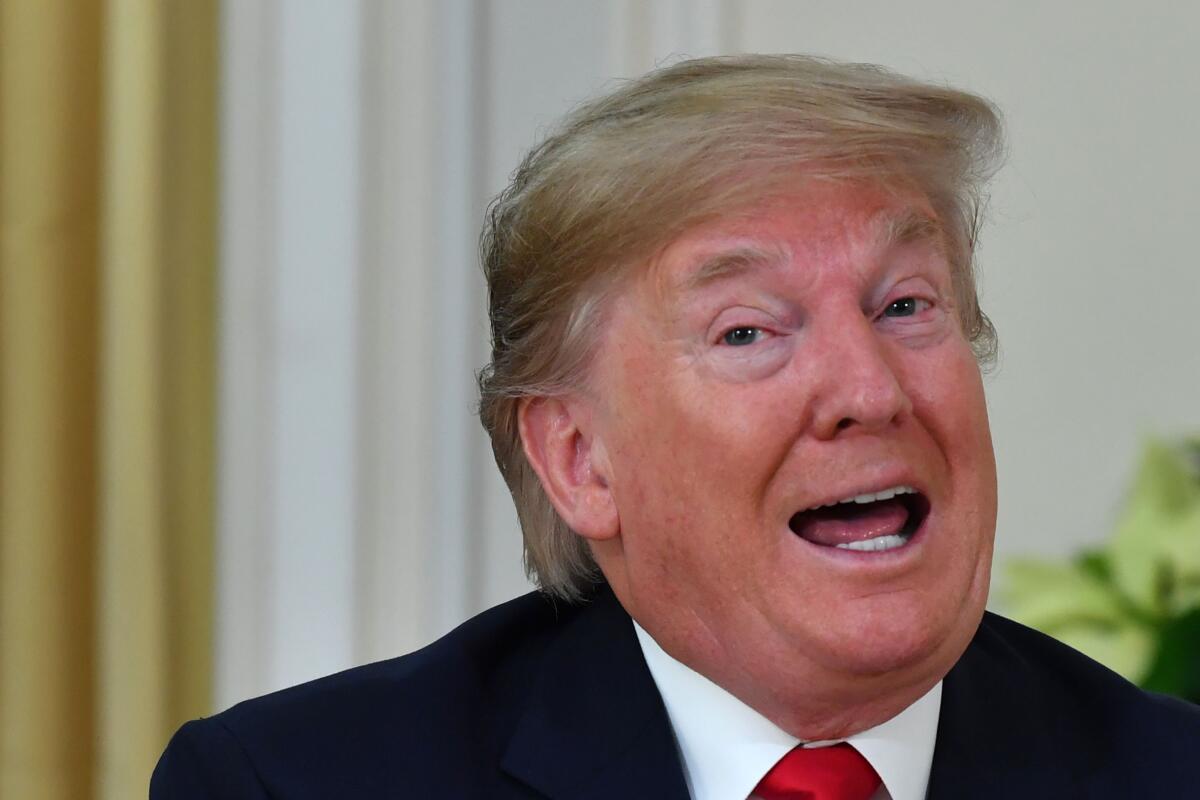Trump claims Constitution shields his tax returns from public

- Share via
WASHINGTON — Lawyers for President Trump told the Supreme Court on Thursday the Constitution shields the chief executive from being forced to disclose his tax returns in response to a subpoena from Congress.
“Imposing financial disclosure requirements on the president intrudes in an area that the Constitution fences off,” they said in Trump vs. Mazars. “Requiring the president to disclose his personal finances as a condition of holding office is unconstitutional.”
The justices probably will ask the House to respond next week to Trump’s claim and could announce by the end of next week whether they will consider the case, which involves a House effort to compel Trump’s accounting firm, Mazars USA, to turn over his financial records and tax returns.
The justices also could look at a second case in which the district attorney in New York City, Cyrus R. Vance Jr., has subpoenaed the accountants to turn over several years of Trump’s taxes. That case involves the district attorney’s investigation into hush-money payments that Trump and his company made to at least one woman who alleged she had an affair with him.
If the high court turns down the appeals, the accountants have said they would move quickly to comply with the subpoenas. If the justices agree to hear one or both cases, however, that would set the stage for a high-stakes constitutional clash between the White House and Congress.
Trump’s broadly worded claim is the latest of a series of assertions of executive power by the president’s personal attorneys. In other cases, they have contended the president has “absolute immunity” or a constitutional shield against outside investigations.
So far, those claims have mostly fared poorly in court. Federal district judges and two federal appeals courts, in New York and Washington, have upheld the subpoenas, but Trump’s lawyers hope to get a more receptive hearing from the Supreme Court’s conservative majority.
The House Committee on Oversight and Reform said it was looking into possible conflicts of interest involving Trump and potential violations of disclosure laws. The appeals court, in a 2-1 ruling, said the House has broad power to conduct investigations and to recommend new legislation.
Disagreeing with that conclusion, Trump’s lawyers said the Constitution vests special authority in the president and cited an 1838 decision which said the president “is beyond the reach of any other department, except in the mode prescribed by the Constitution through the impeaching power.”
Even though Trump is the subject of an impeachment inquiry, his lawyers say the House committee’s demand for his taxes came in April, well before the inquiry began. They said it amounts to inappropriate meddling in the president’s personal affairs.
The justices already have shielded the documents from being turned over while they consider whether to hear Trump’s case as well as his separate appeal of a court order that requires the same accounting firm to give his tax returns to the district attorney in New York City. The court could say as early as mid-December whether it will hear and decide the cases.
Yet another case involving House subpoenas for Trump’s records from New York banks also is headed for the Supreme Court, and the justices are likely to prevent the handover of any documents for the time being.
More to Read
Get the L.A. Times Politics newsletter
Deeply reported insights into legislation, politics and policy from Sacramento, Washington and beyond. In your inbox twice per week.
You may occasionally receive promotional content from the Los Angeles Times.











